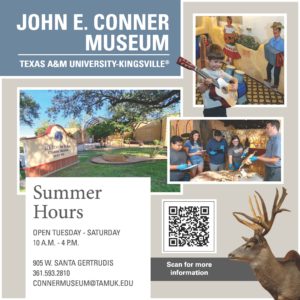Dr. Craig A. Meyer is a professor who uses his voice for good. He makes his classroom a safe and equal space for his students, no matter their background, former students say.
Discrimination against a student’s race, sex, religion, sexuality or age is not tolerated within the walls of his classroom or in his presence. Meyer strives to make his students feel equal and safe and is open about his support of the Black Lives Matter movement. Meyer can be seen around campus with BLM pins adorning his shirts.
Meyer is an Associate Professor of English at Texas A&M University-Kingsville who, “cares about the growth of his students and the education he provides them,” former student Robert Trujillo said.
Trujillo is an English teacher at Santa Gertrudis High School and a former student of Meyer.
“Dr. Meyer helped me realize my potential and what was holding me back from growing as a writer, and more importantly, as an individual,” Trujillo said.
Meyer does not merely seek to inspire the students in his classroom; he challenges his students and pushes them to find answers leading to a place of self-learning. His classes have been described as more than a grade, but more as an opportunity to learn about individual potential to grow as a scholar, Trujillo said.
“He taught me that I need to think for myself and to not only stand up for others, but to help guide them in finding their voice,” he said.
Meyer described his friends growing up in Michigan as having different skin tones and backgrounds, but not recognizing what it fully meant as a kid.
“I recognized we were visibly different, but it didn’t dawn on me that those exterior aspects impacted how my friends were seen by others, because it didn’t affect how I saw them,” Meyer said. “Growing up we all have a few best friends. Half of mine did not have white skin. To answer this question, why I do what I do, is simple: I do it because it’s the right thing to do. Everyone must decide if they will be complicit and watch injustice or they will speak up and actually do something. I prefer not to be complicit or let injustice have free reign. If one person is treated unjustly, unfairly, unequally, we are all harmed in some way.”
Meyer recalls specific moments relating to injustice that showed problems with race in this country. One specific event included the attack on Rodney King in 1991.
“I couldn’t understand, even comprehend, why they [police officers] just kept beating him. He was in no condition to fight back; yet, they kept beating him and kicking him. It was like the pictures and rare videos of the Civil Rights Movement but happening during my lifetime and in color,” Meyer recalls.
Video captured in 1991 showed King being beaten by four officers – three of them white – after he led them on a chase. They were acquitted of charges and riots ensued in Los Angeles.
The BLM movement has swept the country over the past few years and without it, Meyer said his views would be unwavering over the racial injustice still happening today.
“The importance of BLM is to bring attention to the ONGOING injustices we see almost every day,” he said.
In the classroom, Meyer works hard to not be political and to find ways in which he can provide fair representation of issues. He does this for his students, so they can make better-informed decisions, create and examine their arguments of their own political position.
“I don’t think BLM alone affects the way I teach. Rather, it helps students focus on some of the things I teach in class,” he said.
Dr. Pamela Wright, a professor in the Department of Language and Literature, describes Meyer as interesting and impressive.
“I have not observed him in the classroom, but I have had some discussions with him about his courses,” she said. “I have also seen the texts he uses as well. I know that he makes a conscious effort to introduce diversity and discussions about important issues of the day, like BLM, in his classes.”
Meyer’s constant effort and support of issues gives his students an insight of who he is and the passion he has not only to teach but to keep learning himself.
“We all have room to grow and be better,” he said.
As a teacher with passion, Meyer has hope for a future of equality.
“The idea that a different skin color is better or superior than another is disgusting to me. The Oglala Lakota have a saying, ‘Mitákuye Oyás’iŋ’, which means we are all related and refers to our interconnectedness to each other,” he said.
“To me, that means we need each other. We need each other to grow, to get better, to save each other, to protect each other, to care for and love one another.”
Meyer’s support for the BLM movement gives students an opportunity to learn about the issues faced by the country today.
Though he remains politically ambiguous in his classroom, his voice for the movement shows his students that he is more than just an English professor, and someone who truly values his students not only inside the classroom but in the world.
“Knowledge IS power. I have chosen to use that power to empower others,” he said.

